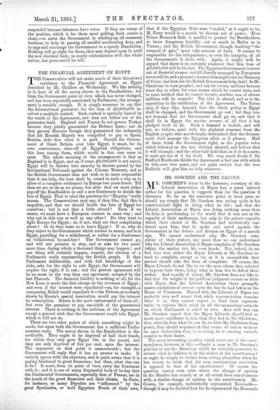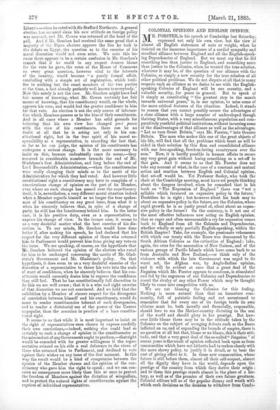MR. GOSCHEN AND THE CAUCUS.
MR. GOSCHEN'S letter to the honorary secretary of the Liberal Association at Ripon has a great interest rather for the question it suggests than for the question it discusses. So far as the narrower point at issue goes, we should say simply that Mr. Goschen was acting quite in his constitutional right in doing what he did ; and that the Liberal Association at Ripon was doing nothing more than its duty in proclaiming to the world that it was not in the capacity of their spokesman, but only in the private capacity which their choice of Mr. Goschen had incidentally conferred upon him, that he spoke and voted against the Government in the debate and division on Egypt of a month ago. We cannot understand why Mr. Goschen complains of their protest, any more than we can understand why the Liberal Association at Ripon complains of Mr. Goschen taking the matter into his own hands. Nor, indeed, do we feel sure that either the Ripon Liberals or Mr. Ooschen intend to complain, except so far as it is unavoidable that protest should take the form of complaint. Of course, the Ripon Liberals do not like to see the man whom they selected to express their views, doing what in him lies to defeat their wishes. And equally of course, Mr. Goschen does not like to find that the weight of his political judgment counts so little with Ripon that the Liberal Association there promptly passes resolutions of censure upon the line he had taken in the House of Commons. Beyond this, the Liberals of Ripon are probably very well aware that, while representation remains what it is, they cannot expect to bind their representative to express their mind on all the momentous subjects on which Parliament is asked to vote. And still less can Mr. Goschen expect that the Riron Liberals should feel BO much more confidence in him than they feel in Mr. Gladstone, that, when he does what he can do, to drive Mr. Gladstone from power, they should acquiesce in that course of action without an open declaration that, in so acting, he is running entirely counter to their desire.
The more interesting question which arises out of the correspondence, however, is this :—Ought a man in Mr. Goschen's position to use the discretion which he certainly possesses, to reverse what he believes to be the wishes of his constituency ? or ought he simply to abstain from voting altogether when he has reason to think that his own conscientious conviction is opposed to that of his constituents ? Of course the question cannot even arise where the change of opinion in the Member has caused, or at all events been simultaneous with, a similar change of opinion in the constituency. Mr. Cowen, for example, undoubtedly represented New castle— though it may be doubted how far he represented the Newcastle Liberals—when he voted with Sir Stafford Northcote. A general election has occurred since his new attitude on foreign policy was assumed, and Mr. Cowen was returned at the head of the poll. And if Mr. Goschen had received the same proof that a majority of the Ripon electors approve the line he took in the debate on Egypt, the question as to the exercise of his moral discretion would not even arise. We note this because there appears to be a certain confusion in Mr. Goschen's remark that if he could in any respect deserve blame for the vote he gave, the votes of the House of Commons on every great question, however vital to the interests of the country, would become "a purely formal affair, concluding with a simple act of registration, which testifies to nothing but the exact numbers of the two parties at the time, a fact already perfectly well known to everybody." Now this surely is not the case. Mr. Goschen might have had fair means of knowing, what Mr. Cowen certainly has fair means of knowing, that his constituency would, on the whole, approve his vote, and would feel the greater confidence in him for that vote. An election is not the only source of information which Members possess as to the bias of their constituents. And in all cases where a Member has solid grounds for believing that his own view has changed pan i passu with the view of his constituents, there can be no doubt at all that he is acting not only in his constitutional right, but in the true spirit of his moral responsibility as a representative, in recording the fact that, so far as he can judge, the opinion of his constituents has undergone a serious change. It is the more necessary to insist on this, because undoubtedly cases do occur,---they occurred in considerable numbers towards the end of Mr. Gladstone's first Administration, and long before the end of Lord Beaconsfield's Administration,—when the constituencies were really changing their minds as to the merit of the Administration for which they had voted. And however little constitutional right a constituency may have to complain of a conscientious change of opinion on the part of its Member, even where no such change has passed over the constituency itself, it is, nevertheless, a very different moral situation indeed when a Member regards himself as no longer the true spokesman of his constituency on any great issue, from what it is when he sincerely believes that, in spite of a change of party, he still has the constituency behind him. In the latter case, it is his positive duty, even as a representative, to express his change of view. In the former case, it seems to us a very doubtful matter what the best exercise of his discretion is. To our minds, Mr. Goschen would have done better if, after making his speech, he had declared that his respect for the very different opinion of those who returned him to Parliament would prevent him from giving any vote on the issue. We are speaking, of course, on the hypothesis that Mr. Goschen believed the opinion of the electors who voted for him to be unchanged concerning the merits of Mr. Gladstone's Government and Mr. Gladstone's policy. On that hypothesis, it does seem to us a very doubtful exercise of the discretion of a representative to throw his vote into the scale of want of confidence, when he sincerely believes that his constituents would earnestly desire him to express the confidence they still feel. That he has constitutionally full discretion to do this we are well aware ; that it is a wise and right exercise of that discretion we are not convinced. And we hold that the exhibition by a Member of sincere respect for the divergence of conviction between himself and his constituents, would do more to render constituencies tolerant of such divergencies, and to render a dictatorial use of the power of the Caucus unpopular, than the assertion in practice of a bare constitutional right. It seems to us that while it is most important to insist on the right of representatives once chosen to express candidly their own convictions,—indeed, nothing else could lead so certainly to such a change of opinion in the constituencies as the misconduct of any Government ought to produce,—that right would be conceded with far greater willingness if the representative evinced on his side a real deference to the views of those who returned him to Parliament, and declined to vote against their wishes on any issue of the first moment. In this way the result would be a kind of compromise between the opinion of the Member chosen and the opinion of the constituency who gave him the right to speak ; and we can conceive no consequence more likely than this at once to protect the freedom of Members against the dictation of wireptdlers, and to protect the natural rights of constituencies against the caprices of.individual representatives.



































 Previous page
Previous page